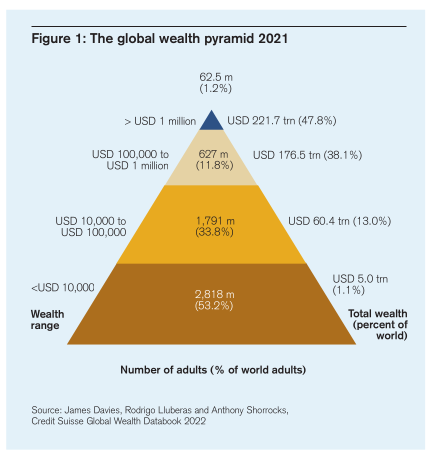One of my financial goals this year is to grow my net worth.
Come to think of it, growing my net worth has been part of my annual financial goals since day 1.
The moment I graduated from college, all I wanted to do was to be able to have enough so that I can be financially free. I never want to rely on anyone – not my employer, not the government – to help me put food on the table or a roof over my head.
The earlier I can break the chain of reliance on other people the better I feel.
That is why net worth is so important to me.
In order to be financially free, I need to make sure my income from my investments can cover all my day-to-day expenses.
Therefore, at a minimum, my investment cash flow needs to equal my expenses.
A robust net worth can help generate a strong cash flow stream.
What Is Net Worth?
Net worth is all the assets you own less the liabilities and debt you owed.
Your assets can be made up of cash, CDs, savings bonds, government bonds, health savings accounts, life insurance policies, real estate, cars, artwork, watches, etc.
Liabilities and debt include mortgages, home equity lines of credit, credit card balances, student loans, personal loans, etc.
You should have at least a positive net worth. The higher the net worth, the better.
In summary, net worth = assets – liabilities
Now, it can be more nuanced than that.
Do you include your primary home? After all, your primary residence is not an investment asset.
What about pre-tax accounts such as your 401(k) and IRA? Is the amount inflated because tax hasn’t been taken out of it yet?
There is a difference between having $1 million in a post-tax account versus in a pre-tax account. Obviously, the tax impact can be significant.
How do you account for your rental real estate or private business? There are high costs to selling real estate properties or private businesses in addition to taxes on gains.
Therefore, the definition of net worth can get tricky at times.
But for simplicity’s sake, let’s go with the easiest, which is all your assets less all your liabilities.
Now that we have gotten the definition of net worth out of the way, let’s examine the average net worth of Americans by age.
Average Net Worth By Age In America
The average net worth in America can be measured in several ways.
Let’s take a look at the net worth information collected by the Federal Reserve in their 2019 Survey of Consumer Finances. 2019 is the latest information collected and they plan to update the net worth information later this year.
There is the median net worth and the mean net worth.
The median is the middle number in a set of data that is ordered from least to greatest.
Taking you back to 4th-grade math, the mean is the sum of all the data items divided by the number of data items.
According to the 2019 Survey of Consumer Finances, the median net worth by age is $14,000 for those under age 35, $91,110 for those ages 35 to 44, $168,800 for those ages 45 to 54, $213,150 for those ages 55 to 64, $266,070 for those ages 65 to 74, and $254,900 for those age 75 and older.
This means half of the under age 35 Americans have a net worth greater than $14,000 and half of them have less than $14,000 in 2019.
The mean net worth by age is $76,340 for those under age 35, $437,770 for those ages 35 to 44, $833,790 for those ages 45 to 54, $1,176,520 for those ages 55 to 64, $1,215,920 for those ages 65 to 74, and $958,450 for those age 75 and older.
The mean is skewed higher up because of all the high net worth people.
For instance, if there are 2 individuals and one has a net worth of $0 and the other has $100,000. The mean is $50,000.
But if there are 2 individuals and one has $0 and the other has $1,000,000, the mean comes out to be $500,000.
An individual with a high net worth can really skew the result for the mean.
| Age group | Median net worth | Mean net worth |
| Under 35 years old | $14,000 | $76,340 |
| 35–44 years old | $91,110 | $437,770 |
| 45–54 years old | $168,800 | $833,790 |
| 55–64 years old | $213,150 | $1,176,520 |
| 65–74 | $266,070 | $1,215,920 |
| 75 years or older | $254,900 | $958,450 |
American Net Worth Is High Compared To The Rest Of The World
Americans are doing well compared to the rest of the world no matter how you look at net worth.
Wealth, after all, is relative. $14,000 might not look like a large net worth to the average American, but it is a formidable number compared to the rest of the world.
Americans make up 31% of global net worth.
Average Americans can be considered rich when viewed through the global lens as well.

It doesn’t take much wealth to get into the top 50% globally of all adults. In fact, 53.2% of the world’s adults own less than $10,000 in wealth.
If you have over $10,000 in wealth, you are in the top half of wealth among the world’s adults.
That means the average under-35-year-old American falls in the top 50% of all adults globally.
According to the 2022 Credit Suisse global wealth report, the mean wealth of an American is $579,051. That is in the top 10% of global wealth.
The median wealth of $93,271 (50% of Americans have higher and 50% of Americans have lower) is in the top 85% of global wealth.
Even the average American is considered rich by global standards.
Now, let’s examine the top 10%, top 5%, and top 1% wealth holders in America.
Top 10%, Top 5%, and Top 1% Net Worth By Age
Do you want to know what gets you into the top 10%, top 5%, and top 1% net worth by age?
Well, you’ve come to the right place. Read on to find out.
This net worth information comes from DQYDJ.com and is based on the latest data they have in 2020.
The first table shows the net worth by age including the value of the primary residence. The second table shows the net worth by age excluding the primary residence.
The value of the primary residence makes up a significant % of net worth across all age groups.
But unsurprisingly, the younger you are, the greater percentage your home makes up your overall net worth.
Average Net Worth By Age With Home Value Included:
| Age | Top 10% | Top 5% | Top 1% |
| 18-24 | $ 93,732 | $ 141,580 | $ 435,077 |
| 25-29 | $ 152,063 | $ 230,249 | $ 606,188 |
| 30-34 | $ 258,741 | $ 425,896 | $ 956,945 |
| 35-39 | $ 601,341 | $ 937,792 | $ 4,034,486 |
| 40-44 | $ 848,815 | $ 1,510,364 | $ 7,909,637 |
| 45-49 | $ 1,354,761 | $ 2,695,929 | $ 10,494,100 |
| 50-54 | $ 1,440,829 | $ 3,330,377 | $ 13,524,094 |
| 55-59 | $ 2,506,118 | $ 4,794,190 | $ 17,545,849 |
| 60-64 | $ 1,995,238 | $ 5,040,132 | $ 14,629,637 |
| 65-69 | $ 1,939,467 | $ 3,913,689 | $ 16,439,046 |
| 70-74 | $ 1,966,166 | $ 5,910,309 | $ 12,625,305 |
| 75-79 | $ 1,541,480 | $ 2,492,294 | $ 12,770,142 |
| 80+ | $ 1,655,537 | $ 4,028,356 | $ 9,932,353 |
Average Net Worth By Age Without The Value Of The Home Included:
| Age | Top 10% | Top 5% | Top 1% |
| 18-24 | $ 57,103 | $ 93,785 | $ 187,752 |
| 25-29 | $ 90,285 | $ 185,895 | $ 387,658 |
| 30-34 | $ 150,724 | $ 255,393 | $ 556,306 |
| 35-39 | $ 427,192 | $ 731,009 | $ 3,681,089 |
| 40-44 | $ 647,541 | $ 1,162,661 | $ 6,905,953 |
| 45-49 | $ 1,102,545 | $ 2,080,252 | $ 8,367,120 |
| 50-54 | $ 1,109,275 | $ 2,782,939 | $ 11,379,909 |
| 55-59 | $ 1,948,144 | $ 3,769,817 | $ 16,328,259 |
| 60-64 | $ 1,619,429 | $ 4,238,714 | $ 12,295,542 |
| 65-69 | $ 1,506,406 | $ 3,183,021 | $ 15,408,189 |
| 70-74 | $ 1,612,947 | $ 4,409,818 | $ 10,761,568 |
| 75-79 | $ 1,138,398 | $ 2,089,099 | $ 11,284,348 |
| 80+ | $ 1,262,921 | $ 3,682,336 | $ 8,641,027 |
A few observations about the net worth of the top 10% and above.
There is a spread between being in the top 50% of net worth and being in the top 10%. This is across all age groups.
By the time you hit 45, you need to get to 7 figures to get into the top 10% net worth.
The top 5% in net worth is a lot closer to the top 10% than they are to the top 1%.
Net worth is really skewed at the very top.
By the time age 50 rolls around, you need to get to 8 figures before hitting the top 1%.
For the top 10%, top 5%, and top 1%, wealth is accumulated into their 50s and then it goes down. They are probably done with the earnings and accumulation stage of their lives and are spending their money instead, a la retirement mode.
Why Is Net Worth Important?
Just like mental and physical health is important, a healthy net worth allows more comfort.
With a robust net worth, you don’t have to stress about emergency spending, being able to put food on the table, or about missing a mortgage payment.
A healthy net worth also translates into more passive cash flows.
You should be able to convert the net worth into income streams.
Rental income, interest income, capital gains, and dividend distributions all can come from your investment portfolio built with the wealth you have.
This is the reason why I always shoot to increase my net worth.
I want to make sure I can continue to increase my cash flow to maintain my lifestyle.
How To Increase Your Net Worth
Here are a few things you can do to increase your net worth.
Remember, your net worth is your assets less your liabilities.
Therefore, the two ways to increase your net worth are to (i) increase your assets or (ii) decrease your liabilities. Ideally, you can do both at the same time.
Invest And Allow For Compound Interest To Work Its Magic
I’ve said this many times on this blog but it is worth repeating again.
Compound interest is the most powerful financial force in the known universe.
$10,000 invested every year in the stock market over the next 48 years can result in a $10,000,000 net worth assuming the stock market returns an annual average of 10%, its historical performance.
A total contributed amount of $480,000 can turn into 8 figures when given enough time in the market.
Therefore, if you want to increase your net worth, invest your money and be patient.
Allow the magical power of compound interest to make you rich.
Look For Ways To Increase Income
Always look for ways to increase your income and produce additional revenue streams.
Just as diversification in your investment portfolio reduces investment risks, diversification of income streams reduces income risk.
Some of the ways to increase your income can be starting a new business, working a side hustle, or looking for a higher paying job.
Also, investing in investments that can produce passive income is another great way of producing income streams.
I’ve helped ranked the best passive income investments for financial freedom.
Increase Retirement Contributions
There are a lot of benefits to increasing your retirement contributions.
For one, remember the magic of compound interest. With a long-term horizon, your retirement savings can grow and grow.
Also, don’t pass up free money if your employer offers a company match. There is nothing worse than leaving free money on the table.
Additionally, there are tax incentives for contributing to a retirement account. Your income can grow tax free until withdrawals or, in the case of a Roth IRA, tax free period.
Pay Off Debt
I believe in having good debt, especially when debt is cheap. But with the numerous recent rounds of the Federal Reserve increasing the Fed Funds Rates, debt is getting expensive.
Paying off high interest debt saves you money. Paying down an 8% interest loan is a guaranteed 8% return on your money locked in.
Now, you also have the benefit of putting the money that would have otherwise been used to pay your interest expense into other opportunities.
Cut Expenses
One thing I like to do is to track my expenses. I used to be very diligent in finding out where my money went.
With meticulous tracking, I then identified waste and areas for savings.
That helped me cut down my expenses which provided me with more funds to put to work on the investment side.
Given my financial position now (financially free), I don’t keep track of my expenses as closely as I did before.
But I still track the total outflow amount to make sure it is still reasonable.
It is always a good idea to understand where the money goes and look for savings.
Increase Your Education Level
Unsurprisingly, the higher your education level, the more you can earn.
The more you can earn, the more you can save and invest. And the result of that is a higher net worth.
The evidence proves that.
According to Federal Reserve data, you can see the disparity in net worth across different education levels.
The average net worth is $137,800 and the median net worth is $20,500 for someone with no high school diploma, $305,200 and $74,000, respectively, for someone with a high school diploma, $376,400 and $88,800, respectively, for someone with some college and $1,519,900 and $308,200, respectively, for someone with a college degree.
An investment in education provides the best return.
Just Saving 20% Can Produce Extraordinary Results
Saving 20% of your post-tax income and investing that money can set you up for financial freedom in less than 24 years.
Do you want to have a healthy and robust net worth? The key is to hit that 20% savings number consistently.
Obviously, the higher you can go, the better.
When I was building my net worth, I aimed to save 50%.
Over the span of 20+ years, I built an investment portfolio that generates enough cash flow to cover my expenses.
Now, I save 100% of my post-tax income from work.
Summary
There are many benefits to having a robust net worth including the ability to be financially free and not be beholden to anyone.
The average American net worth is rich when compared to the rest of the world.
It takes significantly more to crack the top 10% and top 5% in net worth than to be average. And the jump from the top 5% to the top 1% is even greater.
There are two ways to increase your net worth: (i) increasing your assets and (ii) decreasing your liabilities. And there are several ways of accomplishing this.
I hope after reading this post, you make increasing your net worth a top financial goal.
To The Audience: What is your age and where do you stand compared to the average net worth in your age bucket? Is net worth something you track and aim to grow religiously? How did you build and grow your net worth?
Other Posts That Might Interest You
Finding The Best Passive Income Investments For Financial Freedom
The Best Million Dollars A Year Jobs
Here’s What You Need To Be Upper Middle Class And Upper Class In NYC – It’s A Lot!
It Takes A Lot To Be In The Top 1% In Net Worth In America Right Now
Average Income In New York City: What Salary Puts You In The Top 50%, Top 10%, And Top 1%?
Average Income In California: What Salary Puts You In The Top 50%, Top 10%, And Top 1%?
How Rich Are Americans On A Global Scale? Very Rich!

Many people work hard to better their physical and mental health. What about their financial health?
I started this blog back in 2019 to help people better their financial health as well.
My financial journey began with tens of thousands in student loan debt. Over the span of 20 years, I am close to achieving financial independence.
I truly believe anyone can get to strong financial health. Hopefully, this blog can help you on your financial journey to greater wealth and financial independence.
You can read more about me here.
Thank you for visiting. Come again soon!
